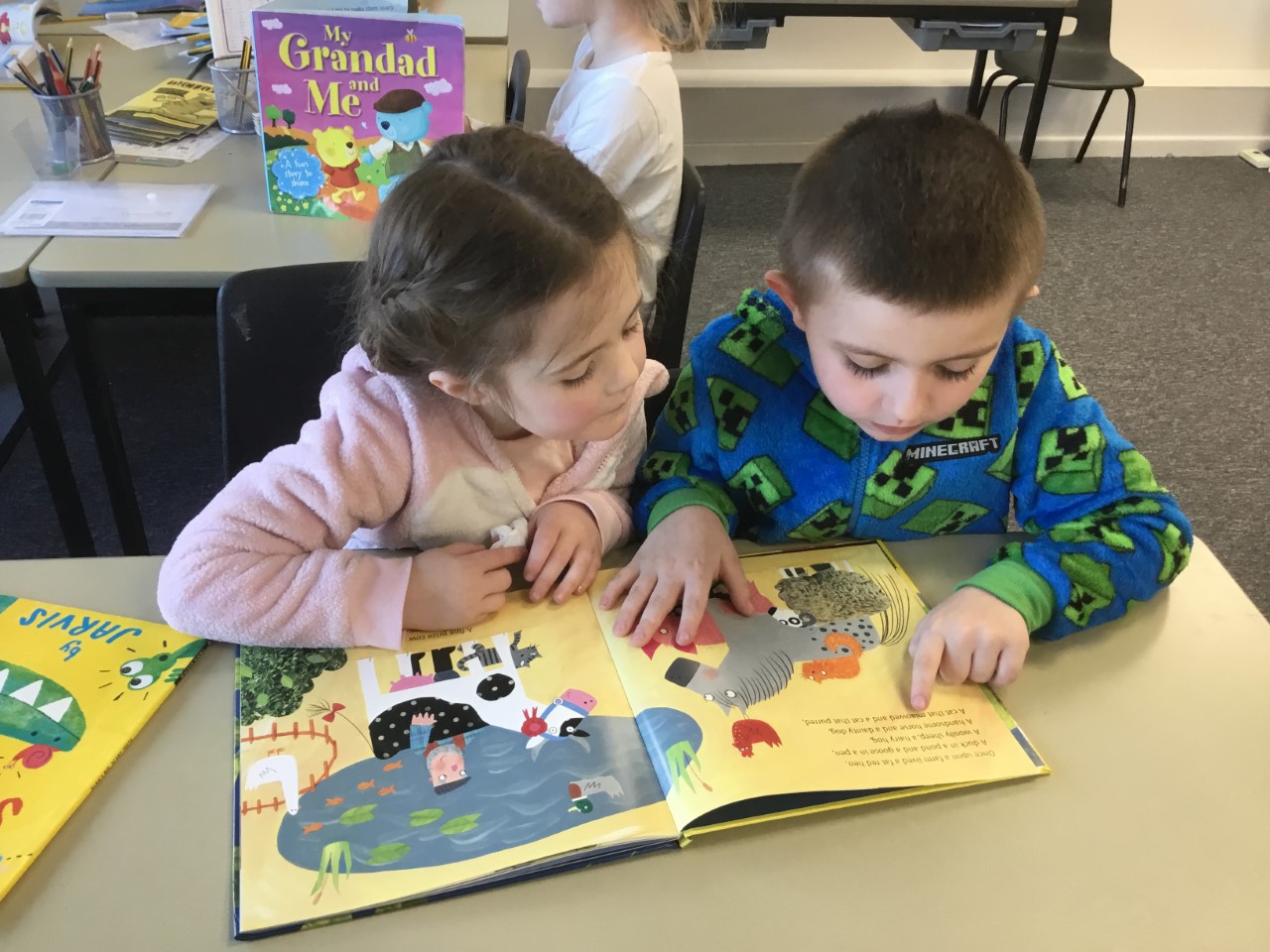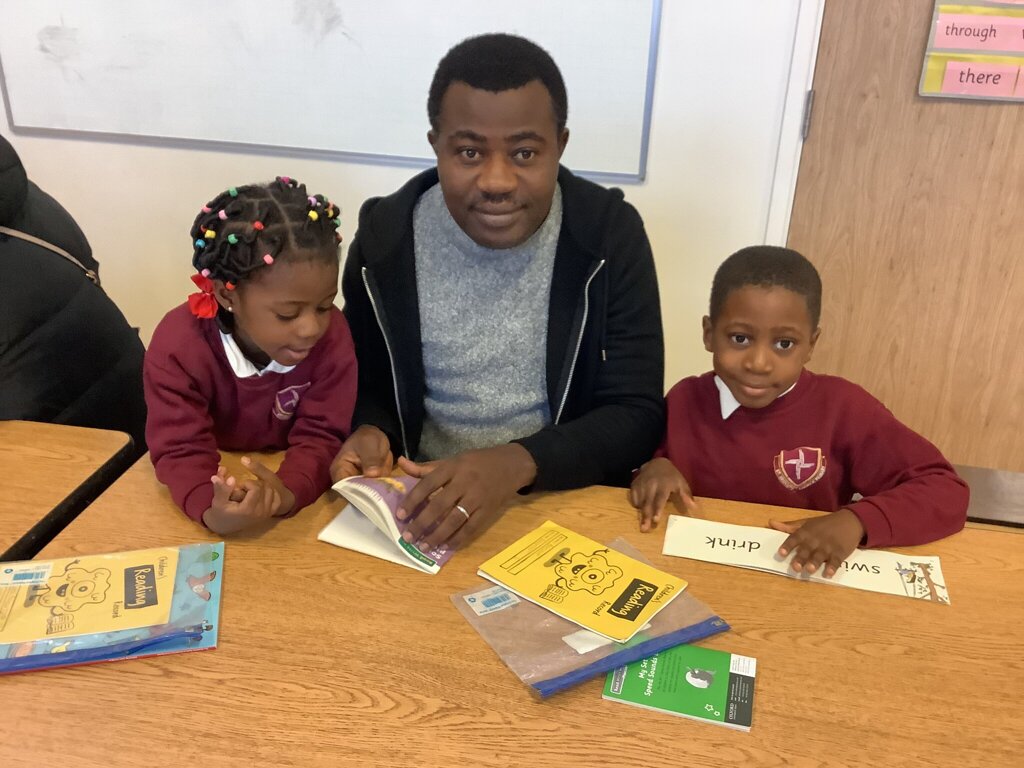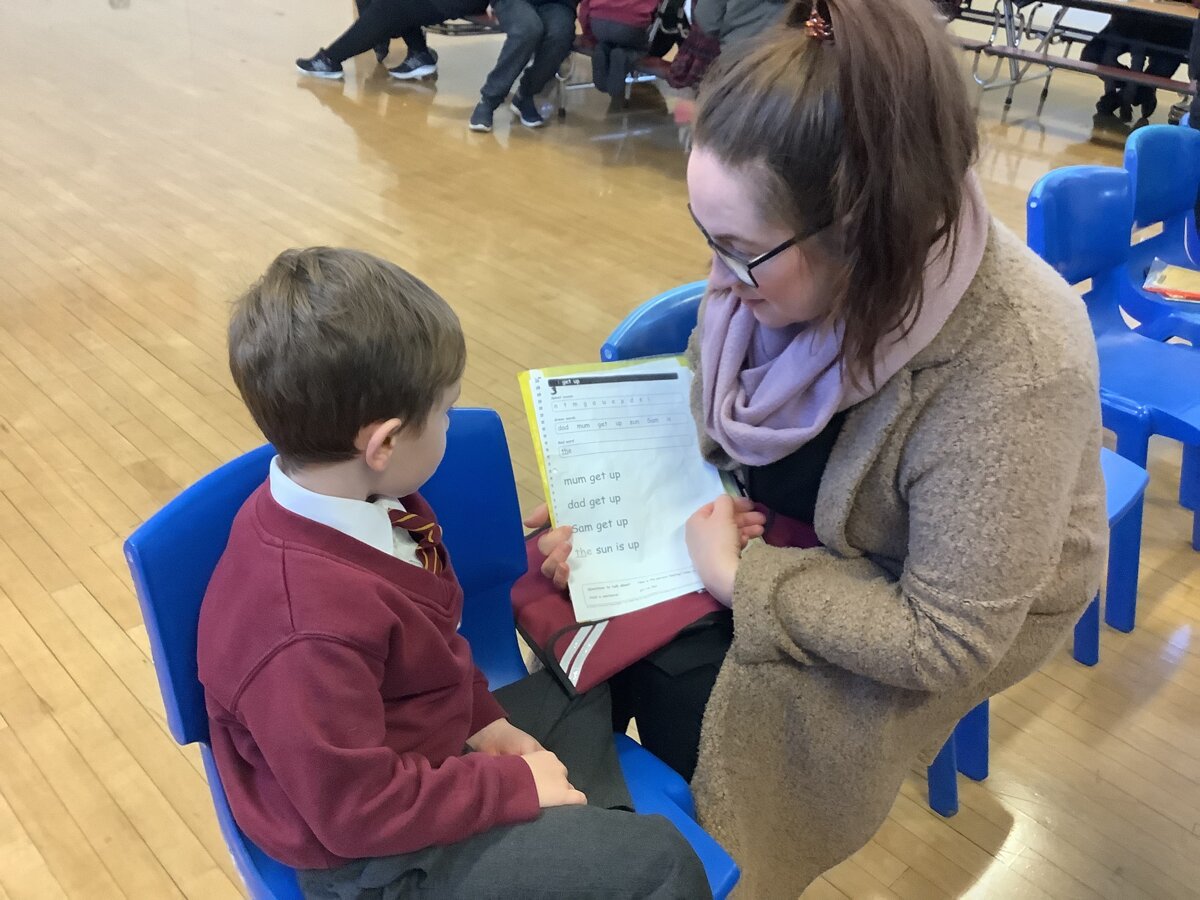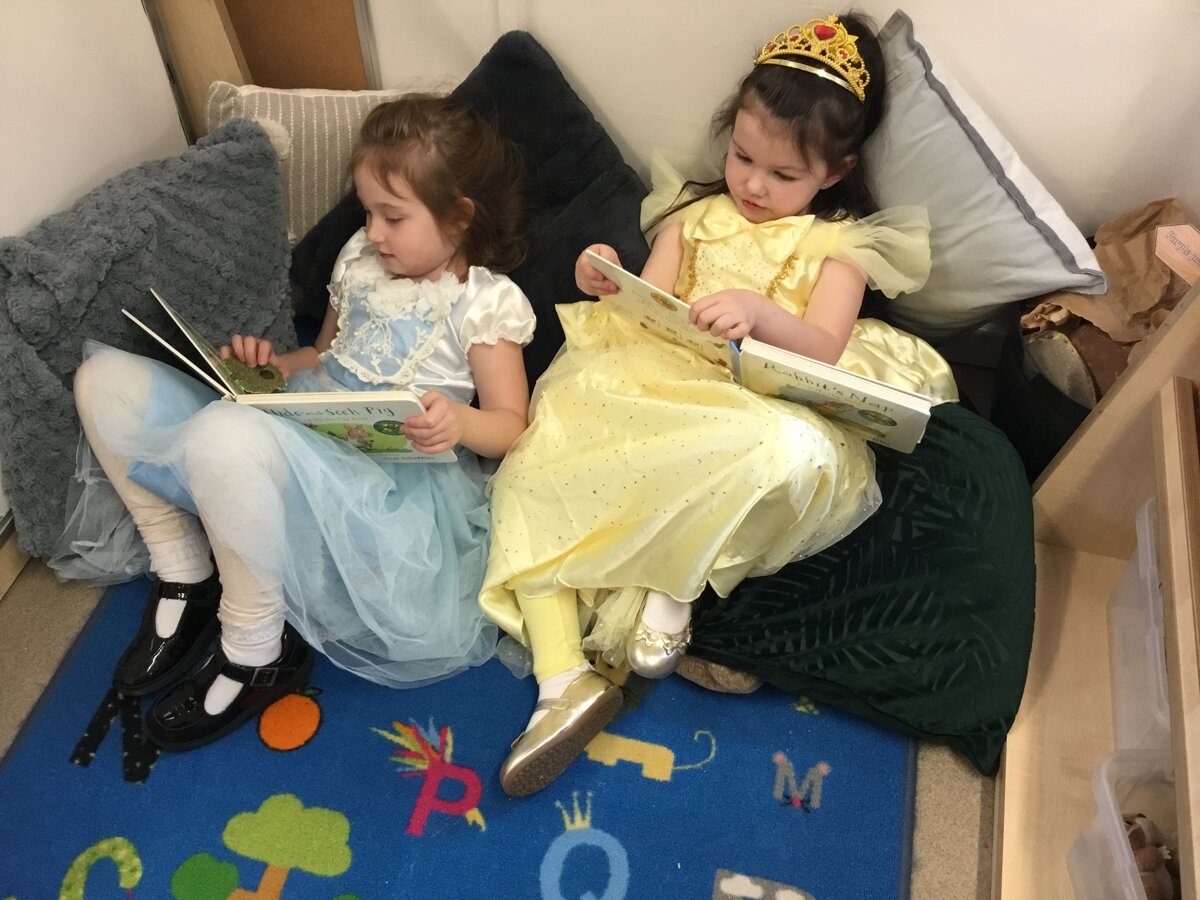Phonics

At St Bridget’s Catholic Primary School and Nursery, we use the highly successful Read Write Inc. Phonics programme to teach our children to read, write and spell. Children begin their phonics journey in the final two terms of their time in Nursery. The children are introduced to the pictures and phrases for each of the single letter sounds. When children enter Reception the children learn the written grapheme for each of the Set 1 sounds including special friends (graphemes consisting of two or more letters). Typically, children at the end of Reception will be secure in all the Set 1 sounds and some of the Set 2 sounds. As children progress from Reception into Year 1 and Year 2, they continue to learn all the sounds in Set 2 and Set 3 before finally completing the programme sometime during Year 2. Each Read Write Inc lesson is taught by a trained adult and has the same structure so children focus on the new learning rather than worrying about what is going to happen next. Children who still need to access phonics in Key Stage 2 also have daily Read Write Inc lessons to ensure they catch up. Specific children from Reception upwards may also receive 1-1 tutoring to enable them to catch up and secure sounds to progress into the next group.
Reading




Seven Aspects of Reading
How do we prioritise reading?
- Each of our classrooms has a reading area where pupils are encouraged and supported to each to choose a book to read for pleasure. Each classroom has a wide selection of books with a selection of fiction, non-fiction and poetry.
- Books are rotated regularly by staff to match the class topic and pupils’ interests, with featured authors and a range of genres.
- Our book shelves are stocked full of high quality and up to date texts that are aimed to satisfy a range of interests and to celebrate diversity in areas such as BAME, neurologically diverse, physical disability, medical conditions, learning difficulties, real life heroes and medical conditions.
- We endeavour to use books and high quality texts to enrich the learning and provide access to a range of genre. These are carefully planned into the long-term English plans for each year group.
- To encourage reading at home we reward pupils with Strive for Five certificates with recognition posted on Class Dojo pages. We also use this to monitor pupils not reading at home so we can provide extra provision in school.
- Reading is celebrated in our school celebration assembly each week, with pupils being recognised in the Green Book. We also hold reading events throughout the year, such as World Book Day.
- Daily reading lessons take place in all classes. Reading lessons in KS2 run first thing from 9am every morning.
- Read Write Inc. (RWI) is followed in EYFS and KS1. Year 2 pupils, who have progressed beyond the RWI scheme, continue to learn to read longer words containing a variety of graphemes and suffixes. Phonics is taught daily with one-to-one tutoring in place to support children to keep up.
- Early reading is encouraged by providing pupils with non-worded reading books in the first instance. Once they have developed their phonics and decoding skills they are then moved on to texts that match their phonic ability and are fully decodable.
- Pupils who are learning phonics in EYFS and KS1 take home at least two books: a RWI reading book or ditty that they have read in school with children in the yellow, blue and grey groups taking the matching book bag book. These books are sent home with an emphasis on reading for fluency. Both these books are decodable. They will also choose a library book as a book to be read to for pleasure. Once children reach the end of RWI grey books they will move to one book a week. This will be a library book from the class library. Children will continue to be given support in what books to choose as their individual reading book.
- In KS2, pupils have access to our class libraries and are encouraged to take library books home to read with their families for pleasure.
- Each class in our school visits our local library in Egremont each term. Pupils have their own library cards and are encouraged to take a book out of the library and return it with their families in their own time or on their next visit with school.
How do we promote a love of reading?
- All staff are expert readers, modelling reading skills, discussing texts read with the pupils and sharing their own love of reading.
- Teachers read class stories to promote a love and enjoyment of stories, immersing them in the world of imagination.
- Our learning opportunities incorporate a range of fiction, non-fiction and poetry, to expose pupils to different texts they may enjoy.
- In our medium and long term planning, we map core texts across the year for each class. Each year group has a suite of core texts that will form the depth study for the academic year. These texts represent a promise from the school to every pupil that it serves of the literature that it is committed to studying throughout a pupil’s school journey. These texts have been mapped carefully to ensure a breadth of experiences, authors, texts and themes is addressed across the Primary years.
- Daily reading lessons allow time for pupils to discuss their reading. They build skills of inference and oracy and help them to make sense of what they have read.
- Pupils are encouraged to access the library and change books on a regular basis. This is in addition to their reading book from our RWI reading scheme.
- We encourage pupils in each class to share their love of reading e.g. by inviting them to recommend great reads to their peers; attend book swaps and making bookmarks for the books they have read.
- We celebrate reading by holding events such as World Book Day, book sharing with other classes (e.g. Y6 children reading to Reception) and story time sessions.
How do we make sure pupils make progress?
- Phonics is taught following the RWI progression of sounds to ensure a systematic approach. Phonics lessons follow the same daily sequence. Planning includes assessment for the graphemes taught. Phonics is assessed half termly to identify gaps in learning to inform future planning and intervention. In the reception year phonics is assessed more regularly in the first term to identify gaps to inform catch up sessions using one to one tutoring.
- Each class has five dedicated 40 minute reading lessons per week. These sessions are well-structured and provide opportunity for pupils to read independently, as part of a group which is teacher led and to develop comprehension and inference skills.
- The school supports pupils to be expert readers by developing the reading key skills through teaching retrieval, comparison, inference, prediction, summary, authorial intent and vocabulary.
- There is a clear progression of reading skills from Reception to Year 6 against which pupils’ progress is measured and gaps are noted and acted on. Teachers use adaptive teaching techniques to ensure all children can access the learning in their lessons and make good progress.
- Pupils who are struggling with phonics as identified in assessments are given one to one tutoring.
- Pupils who need further opportunity to practise reading because they do not read at home, are given priority to read to an adult in school. Class teachers ensure volunteers, who come into school to hear readers, are trained to support reading appropriately.
- Staff have pupil progress meetings and the Reading Lead meets regularly with the RWI reading teachers to discuss progress and next steps.
- We assist parents with supporting reading by providing parents meetings, early reading information meetings, information on Class Dojo, the website and letters home. We also share weekly videos using our Class Dojo platform using the RWI virtual classroom to support reading and spelling.
How do we match the pupils' reading books to their phonic ability?
- Pupils are assessed daily in phonics as well as half termly using the RWI assessments. Assessment then informs which books match to the pupil’s phonic ability.
- RWI reading teachers are responsible for changing and or checking the pupil’s reading books.
- We use RWI throughout Reception and KS1 as a reading scheme. We monitor progress in reading and then match their ability to the stage of reading on the scheme. This is done through daily sessions and the half termly assessments.
- Pupils follow a 3 day reading plan depending on the RWI level. Once the plan is completed the book will be sent home with the accompanying book bag book for reading for fluency.
- KS2 staff monitor the books chosen by children with a huge emphasis being on reading for pleasure and enjoyment both at school and at home. Reading records are used throughout the school so parents can interact with the reading done at home, we use the reading records to monitor reading.
- In our reading lessons we use a range of texts which are selected carefully to challenge the reading of different groups of pupils in school and to ensure a breadth of questioning styles.
How do we teach phonics from the start?
Phonics teaching begins with our youngest pupils from the time they turn 3 in our school Nursery provision. Phase 1 is promoted and embedded within the curriculum, exposing pupils to sound rich activities which provide the foundations for reading and writing. We complete baseline assessments in communication, language and literacy to support and identify speech, language and communication needs. In the Spring and Summer term pre-reception children are introduced to the RWI pictures then sounds.
Pupils begin learning letter sounds on entry to Reception. Following the RWI system pupils are immersed in a directed teaching approach which embeds systematic phonics skills as the core skills for reading. Sounds are taught in a specific order, and regular assessment informs future planning and interventions.
First, pupils will learn to read:
- Set 1 Speed Sounds: these are sounds written with one letter: m a s d t i n p g o c k u b f e l h r j v y w z x and sounds written with two letters digraphs: sh th ch qu ng nk ck ss ll ff
• Words containing these sounds, by sound-blending, e.g. m–a–t mat, c–a–t cat, g–o–t got, f–i–sh fish, s–p–o–t spot, b–e–s–t best, s–p–l–a–sh splash.
Second, we will learn to read:
- Set 2 Speed Sounds: ay ee igh ow oo oo ar or air ir ou oy
- Words containing these sounds.
Third, we will learn to read:
- Set 3 Speed Sounds: ea oi a-e i-e o-e u-e aw are ur er ow ai oa ew ire ear air ure tion tious cious as well as the sounds e-e, ue, au, wh, ph, ie, kn
• Words containing these sounds.
From set 2 pupils will learn 2 or 3 new sounds per week.
To support the learning in school, pupils take home phonic books that match the sounds they have learnt each week. They also take home their phonically decodable reading book to reinforce the sounds taught and the red words (common exception words).
- Phonics is discussed with parents in the Transition to School meeting and parents are given resources to support phonics at home.
- When Reception pupils have started school another meeting on supporting phonics is provided for parents.
- Weekly videos are posted on class dojo using the RWI virtual classroom to support reading and spelling.
How do we support pupils to keep up?
- Summative data is submitted every half-term and pupil progress analysis is taken from this. Pupils identified by class teachers and in pupil progress meetings as not making progress have interventions planned for them and teaching staff are aware of who is a priority for intervention/support.
- Formative data informs day-to-day planning and teachers adapt and change this according the pupil needs.
- Pupils who did not achieve their phonics check receive interventions (daily reader/extra phonics support) and/or work in a group which is teacher driven.
- Where progress becomes a concern, parents are invited to a meeting with the teacher and advice is given as to how they can further support their child at home.
How do we train staff to be reading experts?
- Teaching staff, including Teaching Assistants receive reading and phonics training regularly from the reading lead. The reading leader coaches staff as well as highlights CPD using the RWI portal. The reading leader meets weekly with the reading teachers to discuss good practise and future CPD.
- Subject lead for English attends local network meetings and cascade relevant information back to the school. The reading leader has development days with a RWI consultant and attends additional reading leader training via the English Hub.
- The reading lead, supported by the English lead, monitors reading and offers guidance to staff with follow up actions.
